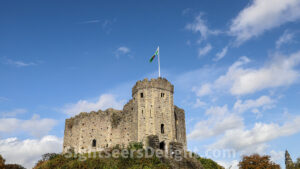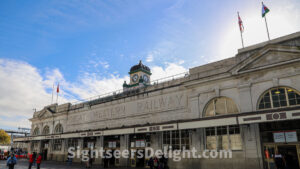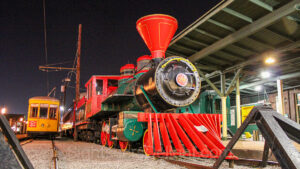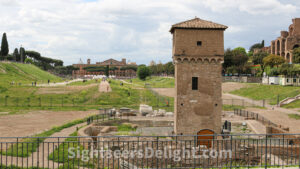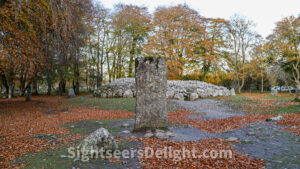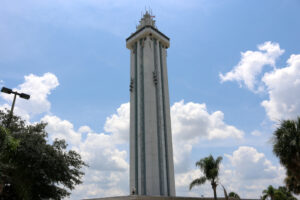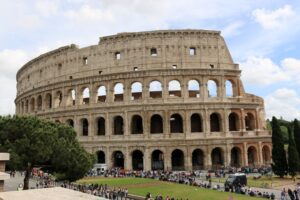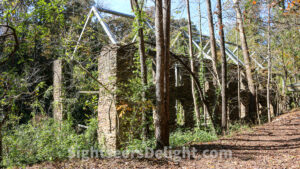The U.S. Lighthouse Service dedicated Cape Neddick Light Station on Nubble Island in 1879; the light house remains in use to today. Plans for a light house date to 1837, but it wasn’t until 1874 when Congress appropriated $15,000 to build a light station that work on Cape Neddick Light began.
Cardiff Castle is a medieval castle and Victorian Gothic revival mansion in the center of Cardiff, Wales. Norman invaders built the original motte and bailey castle in the late 11th century on top of a 3rd-century Roman fort. During the mid-18th century, ownership of Cardiff Castle passed to the Stuart dynasty, specifically the Marquesses of Bute. John, 1st Marquess of Bute, employed Capability Brown and Henry Holland to redo the main range, turning it into a Georgian mansion. In addition to that, the castle grounds were landscaped, and numerous older medieval buildings and walls were demolished.
Cardiff Central Railway Station (Caerdydd Canolog in Welsh) is a significant station situated in the capital of Wales, Cardiff, on the South Wales Main Line. It serves as one of the city’s two primary urban rail network hubs, along with Cardiff Queen Street. The station was established in 1850 as Cardiff Station, later renamed to Cardiff General in 1924, and finally to Cardiff Central in 1973. Wales’s largest and busiest station is one of twenty railway stations in the city and one of two in the city center. Transport for Wales Rail manages the Grade II listed building.
19106
The Chattanooga Choo Choo dates to 1909 when it saw the departure of its first passenger train. The Choo Choo served as a functioning train station until Aug. 11, 1970, when the last passenger train departed. The station has since found a new life as a hotel, and guests can stay in either a standard room or in a refurbished rail car. There are plenty of places at the Choo Choo to eat and shop, and a 1924 New Orleans trolley whisks visitors around the hotel’s grounds.
37402
Circus Maximus, which means the largest circus in Latin, was once home to chariot races during Roman times. The stadium, located between the Aventine and Palatine hills, could hold more than 150,000 spectators and was a model for circuses across the Roman Empire. It is today a public park.
Clava Cairns near Inverness is a well-preserved Bronze Age cemetery complex consisting of passage graves, ring cairns, kerb cairns, and standing stones. It is a significant and exceptional prehistoric site that dates back about 4,000 years. The cemetery was used in two periods, with the first row of large cairns built around 2000 BC. It was reused a thousand years later, with burials placed in some existing cairns. Excavations have found evidence of previous farming on the site. The cairns replaced the settlement, and some materials used to build them may have been taken from demolished houses.
The Clermont Citrus Tower first opened to visitors in 1956. It took 13 months, roughly $300,000, five million pounds of concrete and 149,000 pounds of reinforced steel to build the tower. Counting its antenna, the tower reaches over 500 feet above sea level, making it the highest observation point in the Sunshine State. At one point, more than 500,000 people visited the tower every year. However, the 1964 extension of the Florida Turnpike provided a waste route for motorists and the tower’s popular among travelers began to wane. Then, that roadside oddity called Walt Disney World opened. The rest, as they say, is history.
34711
The Colosseo or Colosseum has lasted generations and is perhaps the best and most widely-known symbol of Rome’s past. Started in 72 AD, the Colosseum could hold 50,000 people, and it could be emptied in a matter of minutes and had a retractable roof. But, if that’s not outrageous enough, the Romans at times filled the stadium with water so they could reenact sea battles for war-loving crowds. Today, the building is perhaps best remembered for the gladiator fights that once took place there. The Colosseum remained in us until it was damaged in a fire in 217, giving it a roughly 145-year run.
Concord Woolen Mills dates to 1847 when Robert Daniell and Martin Ruff opened the mill. The mill was destroyed on July 4, 1864, by Union Gen. William T. Sherman’s troops. The two men rebuilt the mill, which reopened in 1868. By 1870, the mill had 16 workers, making it the largest employer in the area. The two men sold the mill in 1872. The mill went out of business in 1916, and the ruins are located along what is today the Heritage Park Trail and Silver Comet Trail.
30082

